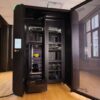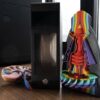Robin Vincent is the brains behind Canobi, an agri-tech company that builds indoor farm management systems and Bob Huggins is a Launch Lab entrepreneur-in-residence who has been providing business mentorship to Vincent. Today, with Launch Lab’s help, Canobi has an angel investment and contracts across Canada and the U.S. as well as Portugal, Uzbekistan, the Middle East and Africa.
Canobi is a perfect example of how Launch Lab’s Amplify program and its partnership with the Southeastern Ontario Angel Network (SOAN) are working together to help companies with high growth potential scale their operations. Launch Lab is a regional innovation centre that supports growth companies with whatever business advice they may need. CEO Scott Runte describes the Amplify program as Launch Lab’s “deeper-dive mentorship program” and it’s where the centre commits a significant amount of its resources, by supporting clients in their growth strategies.

“In many cases, these are companies that have more than $1 million in revenue and they’re trying to accelerate their growth,” Runte says. “or they are early-stage technology companies that are approaching equity investors or angels to raise capital to really begin to fuel their growth.”
Launch Lab has been making its relationship with SOAN a strategic focus as it works to catalyze innovation in Eastern Ontario. After all, Launch Lab brings the mentorship strength to the table while SOAN offers access to investors who are open to making investments in early-stage growth companies.
Launch Lab will prepare the companies to present their pitches and get ready to raise the capital they need.
“We look at honing their pitch, understanding what it means and helping them negotiate the deal once investors show interest,” Runte says. “We provide in-depth mentorship to help them be successful in raising that capital.”
The mentorship Launch Lab provides is in the form of seasoned entrepreneurs-in-residence who have been in their shoes many times before and can help keep them from making mistakes at any stage, particularly in the capital-raising process.
“And if the companies want the continued support, we’re there to support them after they’ve raised capital,” Runte says. “We believe that once you’ve raised the capital, that is the most important time to make sure you’re deploying it in an efficient way, giving yourself the greatest chance to be successful.”
The angel investors are also made aware of the fact that should they invest, the company they’re investing in has access to further business support from Launch Lab after the investment is made.
The SOAN partnership has broadened the angel playing field for companies looking for capital. The introduction of the SOAN chapter model has allowed companies to physically pitch to investors in one location and have that pitch be live simulcast to investors in other chapters.
“The hybrid model of conducting meetings that we have all become used to during the pandemic is benefiting investors and companies seeking capital here in Eastern Ontario, thanks to the chapter model that SOAN has deployed.”
Propagating an indoor farming business
Robin Vincent kind of fell into his current business, now a going concern with projects across the globe — from Portugal to Uzbekistan and the Middle East to Malawi as well as clients across Canada and the U.S.
And he credits Launch Lab, a regional innovation centre, and the Southeastern Ontario Angel Network (SOAN), with some of his success.
“My interactions with Launch Lab have been fantastic,” says Vincent, CEO and founder of Canobi AgTech. “One of the things about being an entrepreneur is it’s lonely. Having a resource you can reach out to and get an opinion on is essential.”
And when it came to raising capital, the SOAN angel investors were also invaluable.
“I wasn’t interested in debt without a plan,” Vincent says, having bootstrapped the company to that point. He had been working with his Launch Lab advisers on how to scale, secure and negotiate investments. The introduction to SOAN came at just the right time.
Canobi provides all of the technologies an indoor farm or greenhouse requires to operate, including tools for monitoring, automation and business practices.

“We deal directly with farms so we’ll supply them all of the sensors they need to monitor every aspect of their grow room, including air and nutrient quality, and we provide the automation gear that takes the sensor data and makes decisions about controlling air conditioning and CO2,” Vincent says.
All of that data flows into Canobi’s SaaS business tools that give clients a full-blown enterprise resource planning toolkit they can use for project management, accounting, purchasing, warehouse management and harvest management.
Vincent came to the business idea after dabbling in aquarium science in a semi-commercial way and using data to reduce the mortality rates of some of the most sought-after aquatic creatures. Then he realized he could probably do the same for indoor farming.
“I wanted to reduce the field-to-plate process,” Vincent says. “It’s crazy that in Canada, we import 70 per cent of our food.”
His first customers were in the medical cannabis field, but now he’s expanded to all manner of indoor farms.
Launch Lab adviser Bob Huggins has worked with many companies over the years.
“This really caught my eye,” he says. “Robin is a brilliant guy. With very little fanfare, he’s getting a lot of attention and we’re targeting $1 million in sales this year. I often tell entrepreneurs, ‘Just listen to the advice. We can often save you time and effort.’”
Huggins liked the idea of helping Canadian companies to grow good food locally, and year-round.

“We’ve got some really interesting conversations going on with companies that have deep pockets,” he says. “You’re going to see a propagation. We’re very pleased to be involved.”
Vincent, with the support of Launch Lab, has completed a six-figure convertible debenture and plans to pursue a series-A round. With a potential lead investor in California, everything is accelerating.
Launch Lab CEO Scott Runte couldn’t be happier.
“Canobi is an example of a company that got the benefit of our Amplify program as it was getting ready to raise capital,” Runte says.
Angels from Eastern Ontario
The South Eastern Ontario Angel Network has partnered with Launch Lab to create a powerhouse of possibilities for high-potential startups.
Mosaic Manufacturing, a company started by three Queen’s University graduates, has raised $6 million in capital, sold more than 10,000 of its 3D printing units in 70 different countries and has agents across Europe and Asia who continue to sell its products — the Palette and Array.

And Chris Labelle, co-founder and COO, says he and his co-founders couldn’t have done any of it without the advisory support of Launch Lab and the investment support of the Southeastern Ontario Angel Network (SOAN), which, along with Founder Fuel from Montreal, gave them their first cash injections back in 2015.
Palette takes different materials and feeds them into a printer and is now the most widely used technology in the world for multi-material 3D printing. Array is an automated 3D printing system, with an automated robotics system and material switching at the back end.

“It cuts the cost of printing down by up to 95 per cent and one operator can run 250 machines instead of 15,” Labelle says. “Array is a way for people to allow or achieve scalable 3D printing.”
The company now has 50 staff members and is about to start another round of funding. And its three founders still rely on the mentors and investors who gave them their start.
“It was through the advisory relationship with Launch Lab where we got connected to SOAN,” Labelle says. “We have a really good relationship with some of our SOAN angels and getting their advice on businesses they’ve scaled has helped tremendously. At SOAN, some of the investors are running companies that have the same problems as us, or have problems that our products can help solve.”
Labelle says SOAN has been supportive from the start. “For us, the value of SOAN has been that they’ve been really supportive investors,” he says.
“It’s about building really good long-term relationships. Back then, we were three students in a room and we were very much a gamble. I don’t think we could have gotten to where we are without the support of Launch Lab and that first break that SOAN gave us. The SOAN investors have been friendly to work with, understanding and supportive. We’ve had times when things aren’t going so well and they’ve supported us through that.”
SOAN’s chapter model
SOAN describes itself as a “group of passionate, early-stage investors” that invests in “companies across Eastern Ontario with the potential to grow and build a successful business, creating local employment and changing the world, one company at a time.”

Mike Amos is the managing director of the group and manages it in partnership with Launch Lab. Until recently, the network has been centered in Kingston and included 140-plus angel investors from Belleville to the Quebec border.
“We were quite Kingston-centric in nature,” Amos says of the group’s origin. “Geography was playing a big part in that, so we developed this chapter model. We have one centre for administration and shared services and then local chapters.”
Through video calls, the chapters can hold meetings on the same nights and connect both audiences and pitchers to each other. A company presenting in person in Kingston can also reach investors in Cornwall when the Cornwall investors tune in remotely from their in-person meeting, and vice-versa.
“It’s an interesting group,” Amos says. “Most of our members are very excited about helping their communities become future-proofed. They want to help create something for future generations.”
Working with Launch Lab has been a great partnership, Amos says. “We’ve done a really nice job of working together as a unit,” he says. “We can provide capital and Launch Lab can provide capability,” he says.
Scott Runte, CEO of Launch Lab, agrees that the partnership has been a good one.
“Companies are getting access to capital and high-quality mentorship,” Runte says. “We believe these are two key ingredients to help companies at this critical time.”
Amos says the group has helped a lot of people “make their dreams come true” — from microbreweries such as Spearhead Brewing Company to deep-tech operations such as Spectra Plasmonics.
“Once you tap into mom, dad and your aunt and uncle, where else do you go? With our angels, they roll up their sleeves and get involved. It’s all you can do not to get involved.”
Adapting power and the business plan
DigiQ Power has yet to go to market, and yet, it already has revenue through pre-orders. It’s the kind of thing that would make a Dragon on CBC’s hit show Dragons’ Den offer an appreciative dull roar.

And company founder Yan-Fei Liu gives some of the credit for the success his fledgling company has already seen to Launch Lab and its advisers.
“Launch Lab played a critical role in this,” Liu says. “If I were to do it myself, it would grow very slowly. To grow faster and secure investments, I couldn’t do it without Launch Lab.”
The startup spun out of Queen’s University in Kingston and commercializes technology developed in the lab, where Liu works as a professor of electrical and computer engineering.
The company develops miniature power supplies for AC-to-DC applications and sells customized micro-controllers. It has more than 15 U.S. and international patents through Queen’s.
“Every gadget we are using today requires smaller, lighter and more cost-effective power adapters and companies like Apple and HP need to manufacture these power adapters,” Liu explains. The company has “cutting-edge and industry-leading” power adaptors for cellphone and notebook computer chargers, which are launching this month, after which it will move on to adaptors for monitors, e-bikes and rechargeable handheld tools.
The first product line, for cellphones and notebooks, will be released in April and on its heels, DigiQ will release adaptors for portable power stations, items one might take camping and use to charge a cellphone, heater or coffee-maker.
The Launch Lab relationship came about on the advice of Queen’s University’s Partnerships and Innovation office.
“They suggested I should talk to Launch Lab,” Liu says. “That was in November 2021.”
Since then, he’s met with Scott Runte, CEO of Launch Lab, and Jacques Pilon, an entrepreneur-in-residence.
“Launch Lab has helped me to focus on the problem we’re trying to solve, from the aspects of product definition and competitive advantages, such as why [a customer] should buy our adaptor instead of someone else’s,” Liu says. “They have also helped us with business, helping us to build a solid financial cash-flow model and financial forecasts.”
Pilon says Launch Lab has helped Liu define his value proposition, competitive advantage and his pitch to angel investors.
“DigiQ is also trying to raise some angel investment and we’ve been helping with Yan-Fei’s investor presentations,” Pilon says. “We’ve been helping to get them to the point where investors can understand them. We’ve had quite a bit of success and there’s a lot of interest in investing.”
In addition, the company has received a significant loan from Business Development Bank of Canada to help jumpstart its sales and marketing initiatives — the next big priorities.

